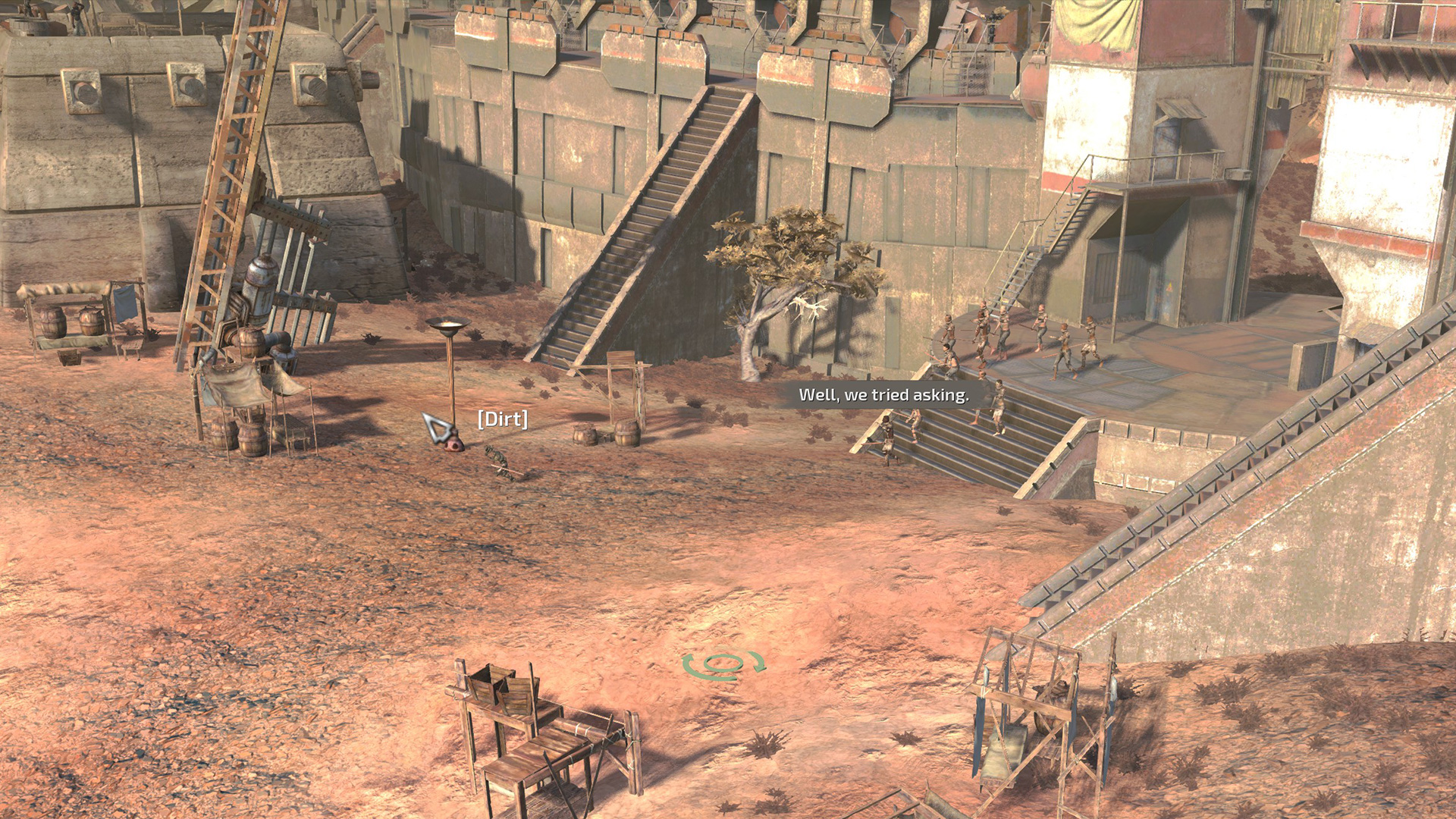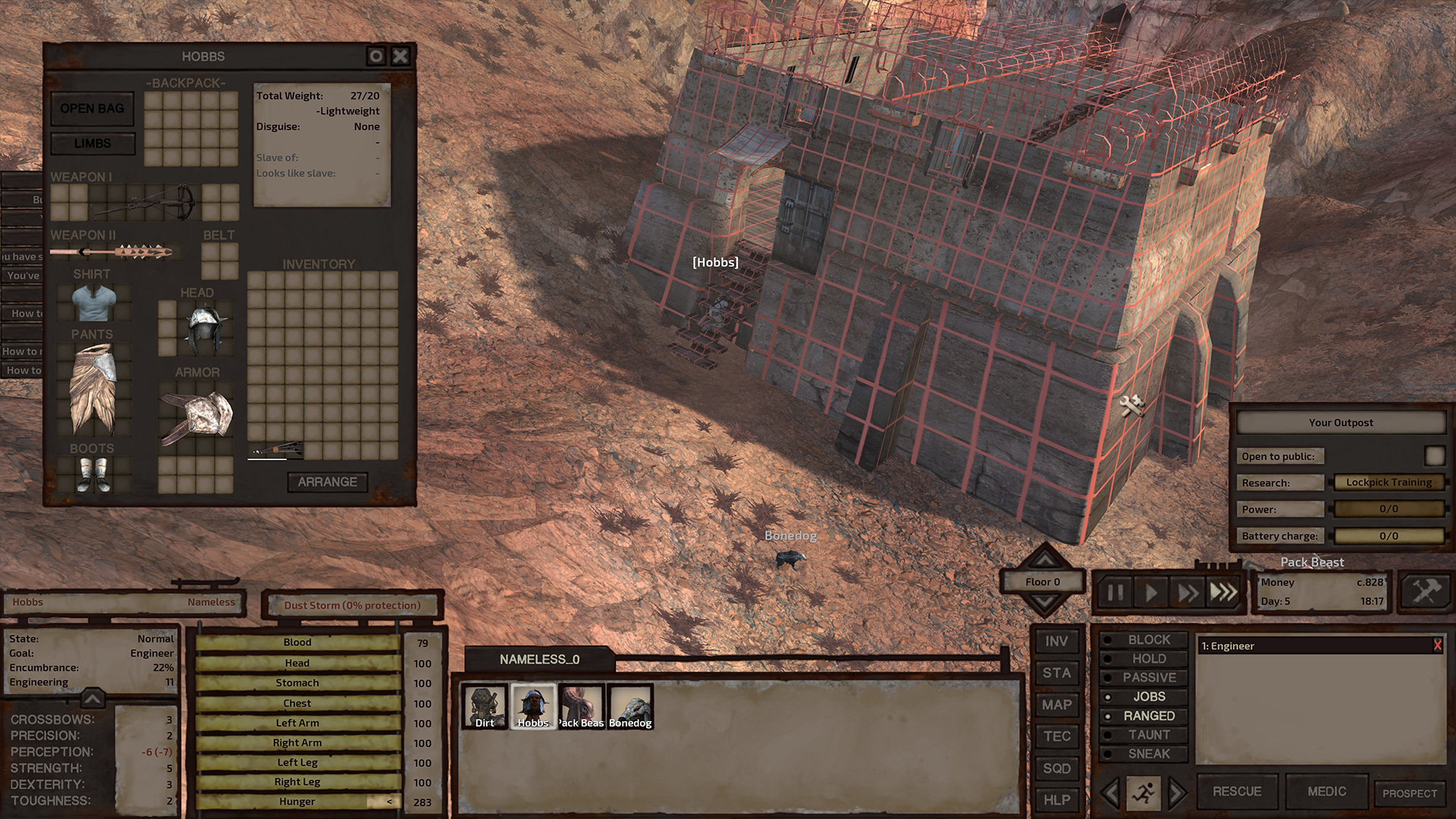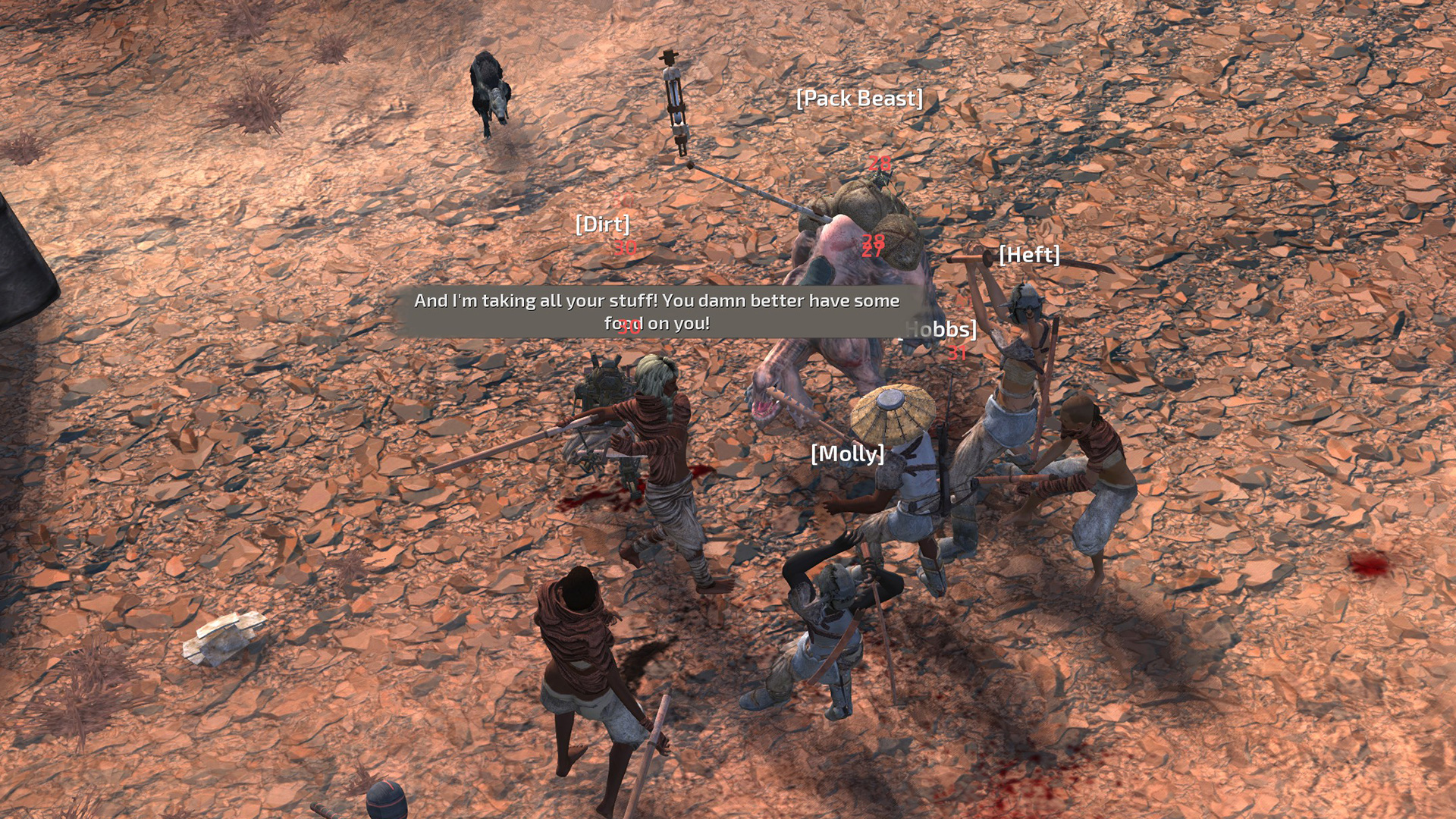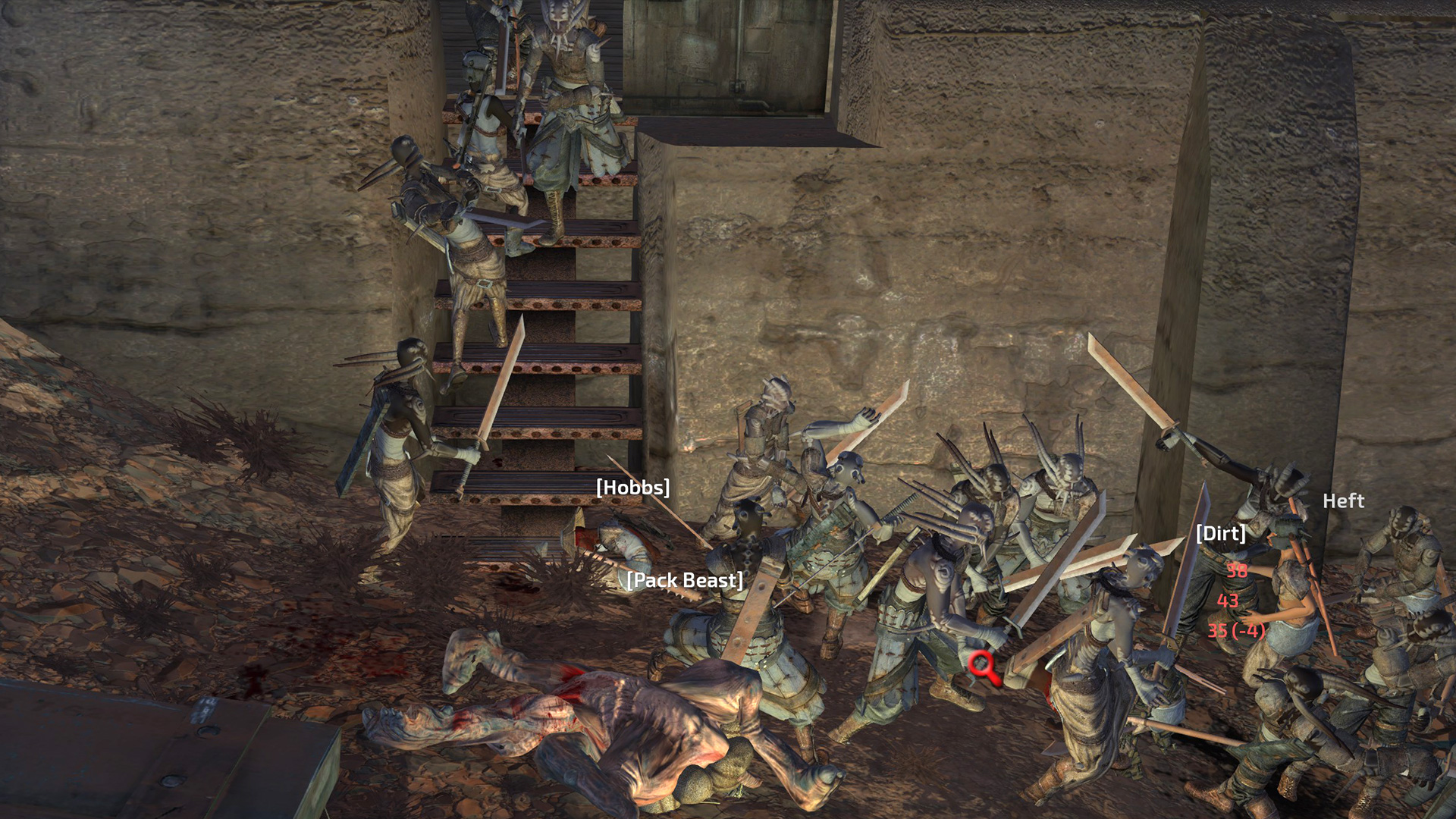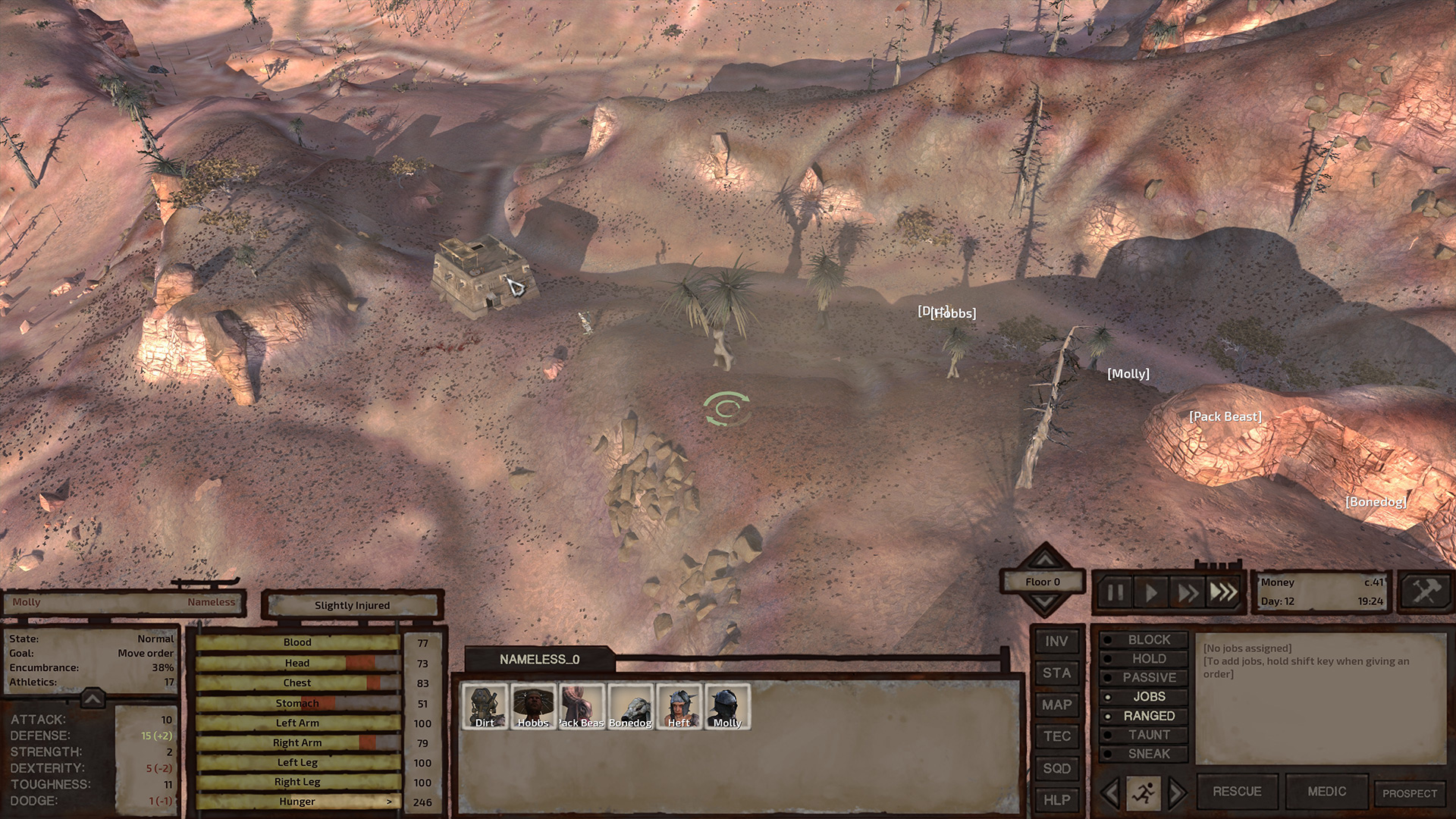Wot I Think: Kenshi
I could, I suspect, dash myself against
Kenshi‘s wind-bleached rocks for a full year and still feel ill-qualified to pass judgement upon it. You might as well ask me to review atmospheric pressure, or continental drift.
Kenshi is everything. Kenshi is nothing. Kenshi just
is.
Before I proceed any further into existential hand-wringing about the amorphous nature of sandbox survival/management/roleplaying maxi-game Kenshi, which just left early access after a half-decade of open development, let me make something clear. Kenshi impresses the bejeesus out of me. Given the opportunity, I’m confident I would play it for a year – more, even.
My mind swims with the possibilities presented by long-term play, a dream of cities in which I laid every brick, planted every crop, recruited and dictated the fate of their every inhabitant, who now man a vast network of mines, factories, shops and defences. Industry and a certain comfort restored to a dead and shattered world.
Or a dream of an endlessly nomadic life, a roaming gang of heroes clearing the vast sands of bandits and thieving iron skeletons and murderers in hiding, feeding my ever-growing, supremely-scarred army with food bought with the armour and weapons I looted from my foes.
Or a dream of solitude, never taking my focus beyond a single character, getting by on a diet of thievery, simple trading, subsistence farming and tense evasion of those bandit packs. Wherever I lay my slightly goofy metal rice-hat, that’s my home.
Or a dream of all of these things, at once. Or none of them.
Kenshi is.
Everyone’s Kenshi story will be different. Some of them will have taken a year, will have built that empire.
Some will have died, lost and alone in the swirling sands, a few short hours or even minutes into trying to figure out how to find or buy food. Some will have done little but hours of mining.
For me, I played it like some mutant, no-pressure RPG. I roamed or battled my way to new places. I grew my party. I upgraded my gear. I wondered and wandered, only setting down roots temporarily, building way-stations to prep myself for further forays. I had experiences.
Dwarf Fortress is a natural touchstone when discussing Kenshi, in that both concern the free-form management of a potential empire in a desolate place, the assigning of tasks and suffering slings, arrows and outrageous fortune. Kenshi feels fundamentally different, however, and not simply because it has much more of a WYSIWYG interface. It’s much more a game of (very slow) exploration than it is one of spinning plates and seeing what shapes they shatter into.
What it most reminds me of is Ultima Online, the MMO grandaddy whose back-of-the-box precis still reads like a game from the future, despite its age-dictated shonkiness. Both offer you a whole world, and shrug at any attempt to divine purpose from it. That’s up to you. Be a hero, be a villain, be a trader, be a manual labourer, work your way from absolute anonymity and poverty to wealth and reputation or any number of stops in between. (And both have slightly insufferable interfaces).
Kenshi is, of course, a singleplayer affair rather than an MMO, which if anything swings open the doors of potential even wider. You can, in theory, reshape this broken desert world as you see fit, rather than being a mere bit player in it. Another remarkable shift – and perhaps Kenshi’s defining feature amongst a sea of remarkable freedoms – is quite how many NPCs you can optionally recruit.
An early foray into Kenshi’s arid world, which is both post- and pre-technology, has you alone, poor and unspeakably vulnerable to the roving bandit packs. But after a few days with it, you too might control a roving pack, finally able to survive those onslaughts – be it to protect your traders and caravans as they shuffle mined or made resources between towns, be it to dispense justice or be it to slay and rob anyone you encounter.
The pack will be made up, essentially, of people you met at bars. Some of them joined for adventure or personal motivations, most for a princely but achievable sum. Some have combat specialisms, some are better suited to farming, researching, building or mining. All can be assigned to any task, and made to improve at it. A few have quiet personalities and preferences, but generally a sense of anonymity abides.
There’s a point where your gang ceases to be a gang and becomes, effectively, a small business – you’ve got your workers here, your warriors there, folk off exploring or trading there… People with permanent jobs they manage themselves, dense networks of farms and machines and stores so everyone can stay fed without your micro-management. I don’t believe that it ever reaches the scale of, say, a city-builder or a Settlers, but it definitely stands in some strange but fresh middle-ground between something like that and a hand-to-mouth survival game like Don’t Starve.
I am, after several days of play, an impossible amount of time away from being a force truly to be reckoned with in its vast, mostly empty, build-almost-anywhere world, but already I’m far past the point where I knew all my guys’ names and specialisms without having to check. I feel like the CEO of a mid-level corporation by this point, only with looms and cookers instead of yachts and Teslas.
At the moment, my ’empire’ is a few scattered stone houses, thrown up in the closest proximity I can to ore deposits close to the few, far-flung, well-guarded NPC settlements. I move my mob between these, gathering resources, selling them for money, spending that money on new recruits. By now, I have two separate squads, though the oddities of the interface make managing them more of a headache than I’d like.
But I could have a city. When I said earlier that I dream of my own cities, I tell no lie. Kenshi gets under the skin, into the blood. Its lonely, dangerous atmosphere, its colossal scale, the growing realisation of how much it will allow me to do if I give myself to its glacial pace, its obtuse controls, its total disinterest in capering for my attention, all gnaw at some hind part of my brain. In between wakefulness and sleep, I imagined what I could build, out there in that desert. House after house to call my own, walled off and guarded, with its own farms and own factories.
It would take years, probably. Would that be a wise use of my time? There can be no ending, no ultimate sense of closure: it would become my job. I applaud that and I am sorely tempted by that, even if I could not possibly justify it.
I should say, too, that Kenshi is not an easy game to sink into. It is a remarkable achievement from a small team, but it is inescapably the work of a small team – the appearance is sometimes crude, quality of life touches you might expect are not there, guidance is minimal, the controls and camera sometimes an uphill struggle. I think this is a small price to pay for the wealth of possibilities offered, but expect an uneven, sometimes confounding experience.
My own is perhaps best exemplified by this early oddity. I’d been able to recruit one other character, but my gang was still so horrifyingly vulnerable, and the work required to simply afford food so extreme. I was morose, and anxious about how I could possibly make this review happen. As I wandered outside the starting town, the one-bar nowheresville known as The Hub, for another slow and thankless round of manually mining iron for a miniscule return, I saw a lonely shape trudging through the stinging sands.

It was not human, or skeleton, or lizardman, or any of the other bipedal intelligent life of this place. It was a packbeast, which I’d otherwise only seen as part of a heavily-guarded caravan, that I could trade with but not possibly hope to steal from, by force or by stealth (not yet). Why was this one alone? Its saddlebags revealed it was not wild, as some were – it belonged to someone. Were they nearby? Had they been ambushed and slain, and this one beast found its way to relatively safety during the attack?
Or had the game glitched, leaving one creature, festooned with valuable building supplies, alone when it should not be?
Feature or bug, feature or bug? That’s a question which has repeatedly dogged my Kenshi experiences.
I don’t think it matters. What matters is that I took a chance and slew that beast. The fight was hard, my pair of men so weak that this exhausted creature was more than capable of kicking their heads in, but they survived, barely. No one came seeking vengeance, though for hours I winced whenever we passed anyone else. And, suddenly, I had an embarrassment of riches. Well, not compared to what would come later, but for now: enough to build a home, a farm, a training room, cooking facilities. Enough to get going, to stake a claim. A shortcut, of sorts.
Feature or bug? Either, both. Whatever the cause, it felt so very Kenshi, this sudden shift, a story all my own, choices all my own. Nothing becoming everything.
I carried the packbeast’s corpse into town, slowly, arduously. I moved its supplies into storage crates or sold them at the bar, until the beast’s packs were empty. When I finally lowered its great carcass to the ground, it launched itself at weightless speed a few hundred feet into the air, then drifted halfway across the desert, finally setting down again God knows where.
Feature or bug? Well, some questions answer themselves. Even this, somehow, felt so very Kenshi. None of that could have happened. I might still be grimly mining the same rock to this day, or I could (as I did much later) stumble across the aftermath of an enormous battle, and make my first fortune from looting strangers’ corpses. Or who knows what else?
A game of everything, a game of nothing. Eternal, unknowable, remarkable, infuriating, Kenshi defies easy judgement. Kenshi
is. I implore you to play it.






























![Glory to Codexia! [2012] Codex 2012](/forums/smiles/campaign_tags/campaign_slushfund2012.png)









